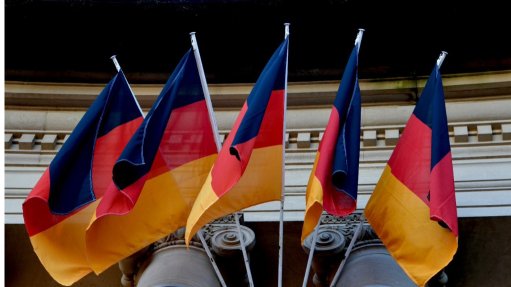
STEADFAST RELATIONS Germany remains committed to its bilateral economic ties in Southern Africa
The Southern African – German Chamber of Commerce and Industry (SAGCC) highlights that the development of many countries in Southern Africa is linked to the mining sector. The organisation asserts that the sector has a greater role to play to support demand recovery, which has declined because of global supply chain disruptions.
Amid current geopolitical developments, the trend towards environmental consciousness is gaining traction and is visible across the mining sector in Southern Africa.
The chamber is a part of a worldwide network of German chambers of commerce abroad, with 140 locations in 92 countries, while the Competence Centre for Mining and Mineral Resources, funded by the German Federal Ministry of Economic Affairs and Climate Action, was established in 2013, in Johannesburg. It is aligned with the German Raw Materials Strategy and aims to support the security and diversity of resource supply for Germany from Southern Africa, where mining features prominently.
Further, the chamber is also a central player in Germany’s bilateral economic relations with Southern Africa, with its having dedicated competence centres for core economic sectors in this region, including for mining and mineral resources, climate and environment, and sourcing.
The chamber asserts that German equipment manufacturing companies are leading the way for digitisation and advanced automation solutions and, ultimately, transforming the mining industry worldwide into a safer, more efficient and more environmentally responsible industry.
Further, in terms of sustainable mining, the SAGCC asserts that the increase in environmental and regulatory requirements has prompted a greater emphasis on enhancing operational efficiencies. The organisation says mines are moving away from traditional mining, towards smart mining.
“With the ongoing efforts to modernise and optimise mining operations, there is a growing demand for innovative equipment and digital solutions. There is also a need to leverage digital technologies, such as the Internet of Things and blockchain, to optimise resource management, track and trace minerals, and improve supply chain transparency,” notes SAGCC mining and mineral resources head Selleen Sewpershad.
The chamber has also identified the hydrogen economy, renewable energy, waste management and recycling, water management and sustainable infrastructure, as well as skills and capacity building, as key sectors on which to capitalise.
Sewpershad cites work in South Africa as an example, highlighting solar and wind resources, coupled with platinum-group metals that are essential in two growing technologies in the zero-emissions hydrogen economy – electrolysers and fuel cells.
SAGCC circular economy sector expert Rishel Dharmapall adds that German companies specialising in sustainable construction and infrastructure development can contribute to building circular cities and green buildings in the region, offering training programmes and knowledge exchange platforms to enhance the skills and capabilities of Southern Africa professionals in the circular economy domain.
The market potential of a target region and demand for its products; taxation policies and incentives offered by government; geopolitical risks; environmental, social and governance (ESG) factors; and the availability of adequate infrastructure, energy and logistics networks are some of the key factors that German companies generally consider when making investment decisions.
Regional Growth
The chamber maintains that German companies are ready to transform the mining industry in this region, as they are typically suppliers of equipment, machinery and technology used in the full mining value chain.
“With Germany being one of the world’s most relevant importers of raw materials, it has an obligation to also promote responsible extraction, socially acceptable working conditions, responsible sourcing and the circular use of raw materials,” Sewpershad elaborates.
She notes that German companies operating in the mining industry in Southern Africa navigate regulatory frameworks by adopting a combination of strategic approaches, including partnerships with local distributors and joint ventures, capacity building through training, and equity through equipment and green financing.
To promote strategic partnerships in this region, the chamber emphasises the importance of knowledge sharing through the facilitation of networking events, trade fairs and business-to-business meetings.
“The mining sector in Southern Africa will play a critical role in meeting the unprecedented boom for raw materials and, with the subsequent increase in mining activities, mining companies are now prioritising adopting Fourth Industrial Revolution technologies to improve safety, increase efficiency and optimisation, and improve ESG conditions along the entire mining value chain,” Sewpershad highlights.
This will create great opportunities for German technology manufacturers and mining investors in this region.